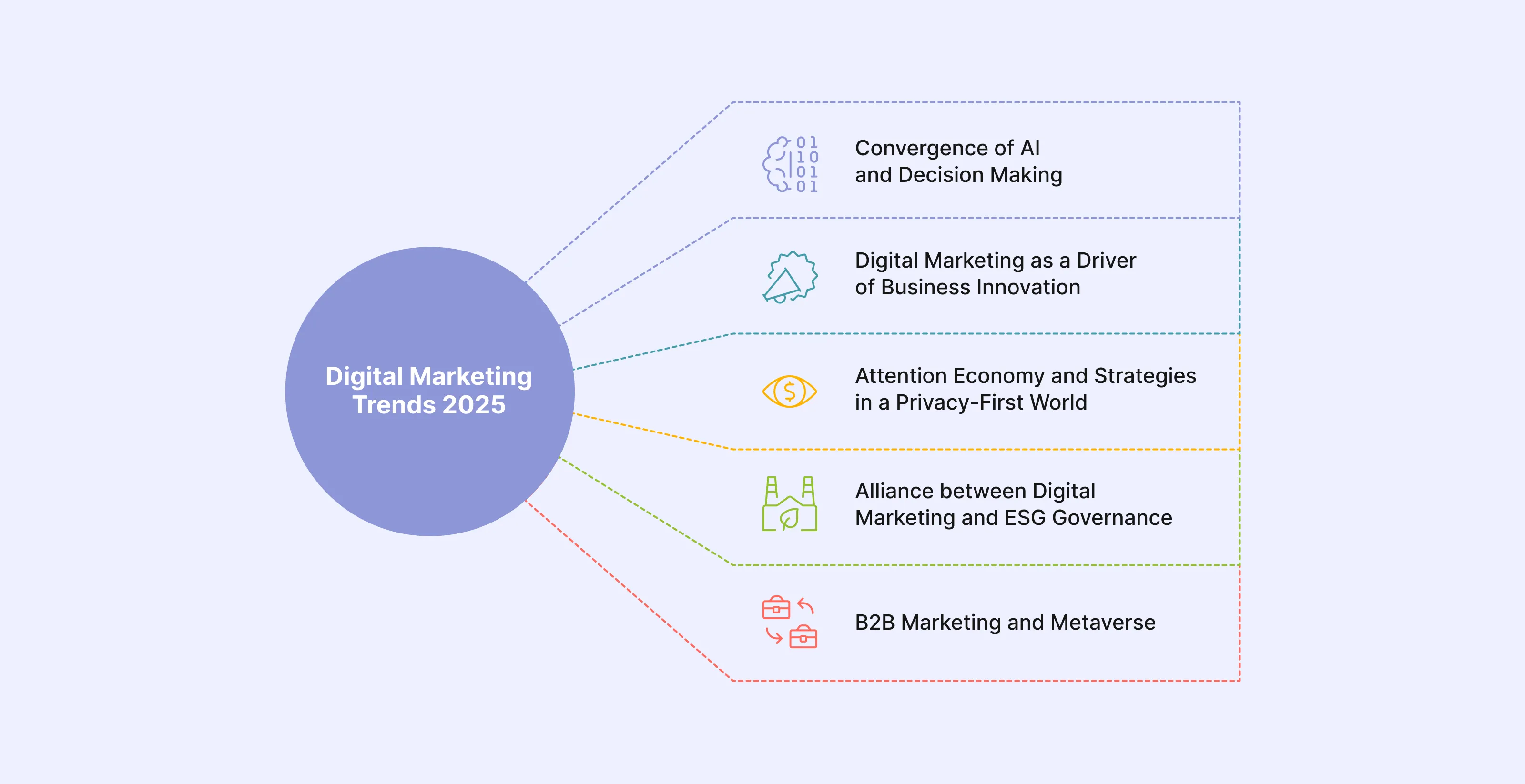Digital Marketing Trends 2025: Driving business transformation through digital innovation

The digital marketing landscape is undergoing a radical transformation that goes far beyond traditional engagement and conversion metrics. For managers and decision makers, understanding and driving this transformation has become a strategic must directly impacting the business value.
Here are the most significant trends that are redefining the role of digital marketing in businesses.
The Convergence of AI and Decision Making: How CMOs are Redefining Digital Marketing ROI in 2025
Artificial intelligence is revolutionising decision making for managers, transforming marketing from a cost-centre to a strategic growth driver. According to McKinsey’s study ‘The State of AI in 2024’, companies that integrate AI into their marketing decision-making processes are not only seeing an average increase in ROI of 20-30%, but are completely redefining the role of the Marketing Manager in the organisation.
Unilever implemented an AI marketing system that resulted in:
– 30% reduction in customer acquisition costs;
– 15% increase in customer lifetime value;
– Marketing budget optimization with 95% accuracy.
As Sarah Mansfield, VP Global Media at Unilever states: “AI is no longer an optimisation tool, but a true strategic partner that informs marketing decisions, a tool that is no longer optional, but necessary to maintain competitiveness in the market of 2025”.

Digital Marketing as a Driver of Corporate Innovation: from Operational Marketing to Strategic Leadership
Digital marketing, once relegated to a supporting role, is now a powerful driver of business innovation. Its ability to generate rich and detailed data on consumer behaviour transformed the way companies make strategic decisions. McKinsey’s study highlights how artificial intelligence, a pillar of digital marketing, is revolutionising data analysis. Companies can now accurately predict market trends, personalise customer experiences and optimise marketing campaigns in real time.
Marketing has become a key player in the digital transformation of companies. No longer limited to operational marketing, it must now assume a strategic leadership role. Deloitte Digital has identified, with The Future of Marketing Leadership, that CMOs must become “digital evangelists”, promoting the adoption of digital technologies throughout the organisation.
Digital marketing not only influences core business decisions, but can also stimulate product innovation. By analysing consumer data, companies can identify new product opportunities and develop innovative solutions. “Nike Direct Consumer Acceleration Report 2024” highlights how the sports brand has leveraged digital marketing to strengthen the direct-to-consumer channel. Through highly personalised social media campaigns and a seamless online shopping experience, Nike has seen a 25% increase in online sales and a 15 % increase in customer loyalty.
The quick development of digital marketing is accompanied by an increasingly complex regulatory framework. Marketers must ensure that their activities comply with data privacy regulations such as GDPR and CCPA. GDPR Compliance Guidelines 2024 and the Digital Markets Act (DMA), provide detailed information on the relevant regulations.
Digital marketing has now become a key driver of business innovation. CMOs must therefore embrace a strategic leadership role, harnessing the potential of digital technologies to drive the growth and success of their organisations.
Attention economy: new targeting strategies to survive in a privacy-first world
The end of third-party cookies is radically transforming targeting strategies.
In addition to Contextual Targeting strategies based on content context and Intent Targeting strategies focused on user search intentions, leading companies are investing heavily in the collection and analysis of first-party data, such as customer data collected directly through their website or app.
Proprietary first-party data ecosystems are proving to be extraordinarily valuable:
Nike saw a 40% increase in direct sales after implementing its first-party data strategy;
American Express reduced customer acquisition costs by 25 % through predictive analytics based on proprietary data.
Companies are adopting different strategies to leverage first-party data, build stronger customer relationships and improve their marketing strategies:
Data unification – Through platforms such as DMP and CDP, companies collect and organise all customer data in one place, gaining a complete view of each individual.
Data analysis – With the help of artificial intelligence and machine learning, companies can discover hidden patterns and trends in the data, allowing them to offer increasingly personalised experiences.
Respect for privacy – It is crucial that companies collect and use data in an ethical and transparent manner, ensuring customer privacy.
What are the benefits?
Better customer insight: With data, companies can better understand the needs and behaviour of their customers.
Customised experiences: Offering tailored experiences increases customer satisfaction and builds customer loyalty.
Increased trust: By being transparent about data management, companies build trust with customers.
Strengthening the brand: Satisfied customers become the best brand promoters.
The attention economy is constantly evolving. Companies that can adapt to new targeting models, leverage first-party data and create engaging brand experiences will be able to thrive in this new digital landscape.

Digital Marketing and ESG Governance: an increasingly strategic alliance
More and more companies are realising that long-term success depends not only on profits, but also on a commitment to sustainability. 76% of CEOs regard sustainability as a strategic priority (PwC, 2024).
By integrating ESG principles (Environmental, Social, Governance) into their marketing strategies, these companies are building stronger brands, retaining customers and attracting new investors. Companies like Unilever have demonstrated how it is possible to align digital marketing campaigns with ESG objectives by creating an authentic and engaging narrative. The company has launched several initiatives, such as the “Dove Real Beauty” campaign, promoting a positive body image and diversity, and has invested in projects to reduce the environmental impact of its products.
To accurately measure the impact of sustainable marketing actions, companies increasingly rely on advanced analysis tools. Sentiment analysis makes it possible to monitor brand perception on social media and in online forums. Conversation analysis makes it possible to identify the topics most discussed by consumers and to understand their expectations. Customer journey analysis allows you to trace the customer journey and identify critical touch points. Predictive analisys is used to predict consumer behaviour and optimise marketing campaigns. In addition, tools such as Google Analytics and Adobe Analytics are increasingly being used to implement detailed performance data on websites and digital campaigns.
The effects of integrating ESG and marketing strategies are increasingly relevant in various areas:
Brand reinforcement – As demonstrated by Patagonia, a brand that bases its identity on sustainability, consumers are increasingly willing to pay more for ethical products and services. Since the launch of its “Don’t Buy This Jacket” campaign, Patagonia has increased brand value by 30%, proving how authenticity in ESG values can translate into concrete results.
Increased customer numbers – Lacoste, with its “Save Our Species” campaign to protect protected animal species, generated a 76% increase in customers.
Increased brand loyalty – A study by Cone Communications showed that 84% of millennials prefer to buy from companies that share their values, and 75% are more likely to remain loyal to a brand if it engages in sustainable practices.
Finally, the year 2025 will see the increasing use of new tools such as ethical influencer marketing – collaborations with like-minded influencers in terms of sustainability, sustainable social commerce – integration of sustainability elements into the online purchasing process, artificial intelligence – personalisation of marketing communications based on consumer preferences, metaverse – further evolution of immersive and sustainable brand experiences, blockchain – ensuring transparency and traceability of supply chains.
In conclusion, sustainable digital marketing is a necessity, no longer an option. Companies that know how to seize these opportunities will be the leaders of the future.

The Enterprise Metaverse: a new frontier for B2B Marketing
The enthusiasm for the metaverse has transcended the boundaries of gaming and entertainment and reached the business world as well. In particular, the B2B sector is discovering enormous potential in immersive technologies, which are redefining the way companies interact with customers and collaborate internally.
The metaverse offers a number of concrete opportunities for B2B companies.
Immersive training: realistic and interactive simulations allow staff to be trained more effectively and efficiently. Siemens, for example, has reduced training costs by 60% using virtual environments.
Virtual collaboration: immersive collaboration tools facilitate teamwork, accelerating decision-making processes and improving productivity. Boeing, for example, accelerated design time by 25 per cent through immersive collaboration tools.
Product design and development: virtual and augmented reality allow products to be visualised and manipulated during the design phase, reducing development time and prototyping costs.
Immersive product presentations: companies can create unique and immersive product experiences, allowing customers to explore products interactively.
Remote assistance: augmented reality can be used to provide remote technical assistance, allowing technicians to visualise and interact with machinery in real time.
ROI of Immersive Technologies
Immersive technologies are not just a novelty, they represent an investment with a real return. In addition to savings on training and development costs, companies adopting the metaverse can benefit from:
Increased productivity – Virtual collaboration and realistic simulations can speed up processes and reduce mistakes.
Improved customer experience – Immersive experiences create a deeper connection with customers, increasing loyalty.
Competitive advantage – Companies that are early adopters of immersive technologies can gain a significant competitive advantage.
As NVIDIA CEO Jensen Huang says: “The industry metaverse is not the future, it is the present of digital transformation”. B2B applications of the metaverse are showing concrete results and are becoming an integral part of many companies’ digital strategy.
Conclusions
The digital marketing of 2025 requires an integrated vision that combines technology, strategy and social responsibility. For C-levels, the challenge is not just to adopt new technologies, but to lead a transformation that positively impacts business and society.
As Microsoft CEO Satya Nadella recently said: “Digital is no longer a marketing tool, but the connective tissue that unites strategy, operations and customer experience”.
Sources and References
>Report and Research
– McKinsey & Company (2024) “The State of AI in 2024: Enterprise Adoption Trends”
– PwC Global CEO Survey (2024) “ESG and Business Value”
– Gartner (2024) “CMO Spend and Strategy Survey”.
– Deloitte Digital (2024) “The Future of Marketing Leadership”.
– Boston Consulting Group (2024) “Digital Marketing Maturity Study”.
>Case Studies and Company Data
– Unilever Digital Marketing Annual Report 2024
– Nike Direct Consumer Acceleration Report 2024
– Siemens Digital Industries Software Case Study Collection
– American Express Data Analytics Innovation Report
>Industry Research
– IAB Europe “Digital Marketing Trends 2024”
– Forrester Research “B2B Marketing Technology Forecast 2024-2025”
– eMarketer “Digital Marketing Benchmark Report 2024”
– Harvard Business Review “Digital Transformation in Marketing” (2024)
>Regulatory Framework and Compliance
– GDPR Compliance Guidelines 2024
– Digital Markets Act (DMA) Documentation
– Digital Services Act (DSA) Guidelines
– ISO/IEC 27701:2024 Privacy Information Management
>Interviews and Statements
– World Economic Forum 2024 – Panel su “Digital Marketing e Leadership”
– Forbes CMO Network Interviews 2024
– MIT Sloan Management Review “Marketing Leadership Series”
Note: All data and statistics quoted in the article are taken from these sources. To access the full reports and research cited, please refer directly to the sources indicated.
Continua a leggere
And it consumes less energy.
To return to the page you were visiting, simply click or scroll.


